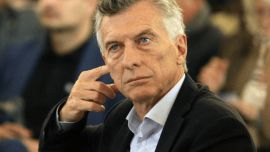The European Union and the Mercosur regional trade bloc have concluded a huge but controversial sweeping free-trade deal that is opposed by France and many European farmers, it was announced Friday.
European Commission chief Ursula von der Leyen confirmed the news on Friday, stating the EU had finalised talks with the four members of the South American grouping, made up of Argentina, Brazil, Paraguay and Uruguay.
"This is a win-win agreement," von der Leyen said in Montevideo, as she attended the bloc's latest top-level summit.
Argentina's President Javier Milei welcomed the news, stating it is "always good to open commercial ties."
Uruguay President Lacalle Pou said the deal is "not only" an important trade deal, it reflected to South America's historic ties to Europe.
"It is not a solution, but an opportunity, and it will depend on us in each of our countries how much importance we give to it," he added.
The agreement calls for the creation of a sprawling free-trade zone of more than 700 million people.
But the deal still needs to be sign off by at least 15 of the European Union's 27 member nations representing 65 percent of the EU population, and by the European Parliament.
That will not be easy, with fierce opposition to the deal in Europe.
'Truly historic'
Von der Leyen called the agreement – nearly a quarter of a century in the making – "a truly historic milestone" that would build trade bridges at a time when "strong winds are blowing in the opposite direction, towards isolation and fragmentation."
But the European farmers' group COPA-COGECA immediately reiterated its opposition, and called a protest in Brussels on Monday.
EU countries and the European Parliament "must now firmly challenge the terms of this agreement," the umbrella organisation said.
France, which has been rocked by successive protests by farmers fearing the agreement would bring unfair competition, has tried to forge a blocking minority of EU countries.
Poland has rallied to France's side, and Italian government sources say Rome believes "the conditions are not met" to back the deal. The Netherlands and Austria have also expressed reservations.
France's minister for trade, Sophie Primas, said in a statement to the AFP news agency: "Today is not the end of the story.... This only commits the commission, not the [EU] member states."
But Germany, eager to open trade opportunities amid gloom for its manufacturing sector, had strongly come out in favour of the EU-Mercosur deal, as had Spain.
German Chancellor Olaf Scholz said on X that "an important hurdle" had been overcome. Spanish Prime Minister Pedro Sánchez hailed a "historic agreement" that would form "an unprecedented economic bridge between Europe and Latin America."
"After more than 20 years of negotiations, the Mercosur countries and the EU have reached a political agreement," he added on X.
Message to EU farmers
The broad outlines of a deal were agreed back in 2019 but it was never ratified amid concerns over the impact of Brazilian farming on climate change, among other issues.
Von der Leyen acknowledged those worries, saying: "The EU-Mercosur agreement reflects our steadfast commitment to the Paris Agreement [on fighting climate change] and to the fight against deforestation."
Brazilian President Luiz Inacio Lula da Silva – who before the summit had declared his intention to finalise the agreement before the end of December – hailed the conclusion of negotiations.
He said in a statement on the X social network that the participating countries had "invested enormous political and diplomatic capital" to get it over the finish line.
He also said the final negotiated text "is very different to the one announced in 2019."
Sources familiar with the negotiations said the deal included changes to chapters including on government contracts, services, intellectual property and the environment.
Von der Leyen also singled out European farmers, telling them: "We have heard you, listened to your concerns, and we are acting on them. This agreement includes robust safeguards to protect your livelihoods."
Changes to come
The deal, once ratified, would allow the EU to export cars, machinery and pharmaceutical products more easily to South America.
In return, agricultural giant Brazil and its neighbours would be able to sell meat, sugar, rice, honey, soybeans and other products to Europe with fewer restrictions.
The treaty aims to eliminate most import taxes between the EU and Mercosur to create a vast free-trade area with a combined GDP of US$21.3 trillion.
French President Emmanuel Macron on Thursday had repeated a warning to von der Leyen that the agreement was "unacceptable in its current state."
Industry group Cámara Argentina de Comercio (CAC) welcomed news of the agreement in a statement.
"The deepening of trade is essential to promote the progress of nations, and the Mercosur-European Union agreement is a powerful tool for that purpose," it said.
– TIMES/AFP/NA























Comments